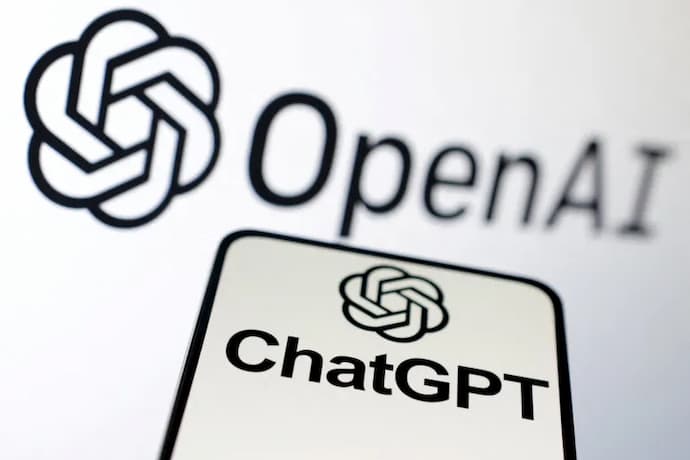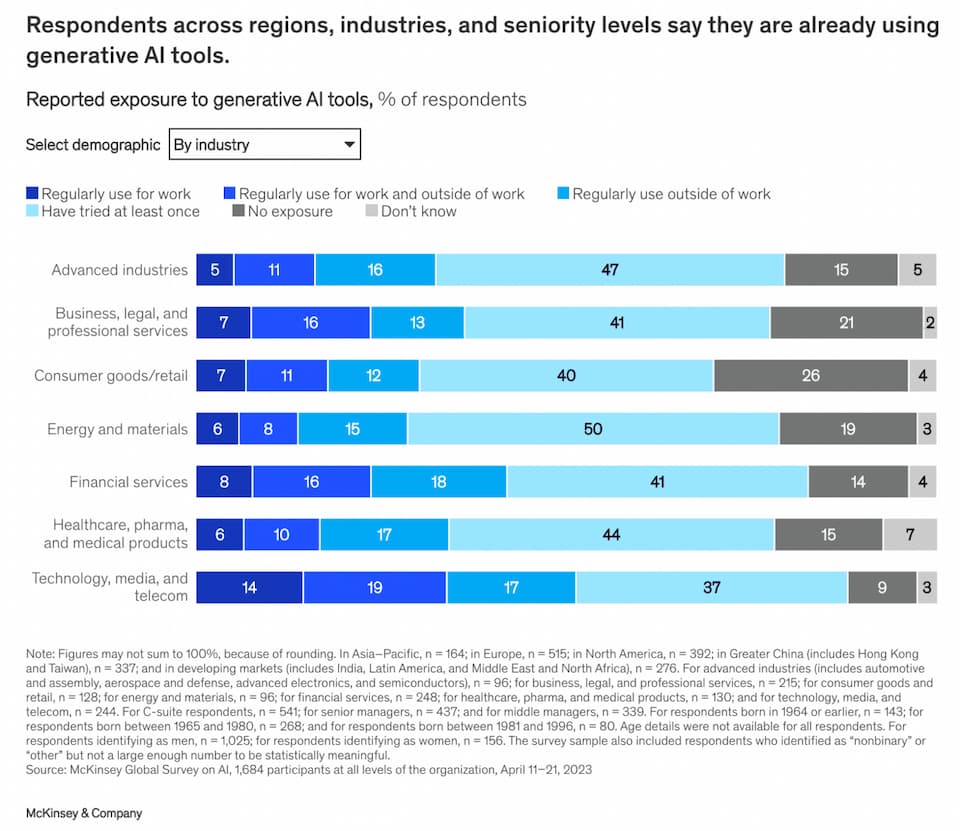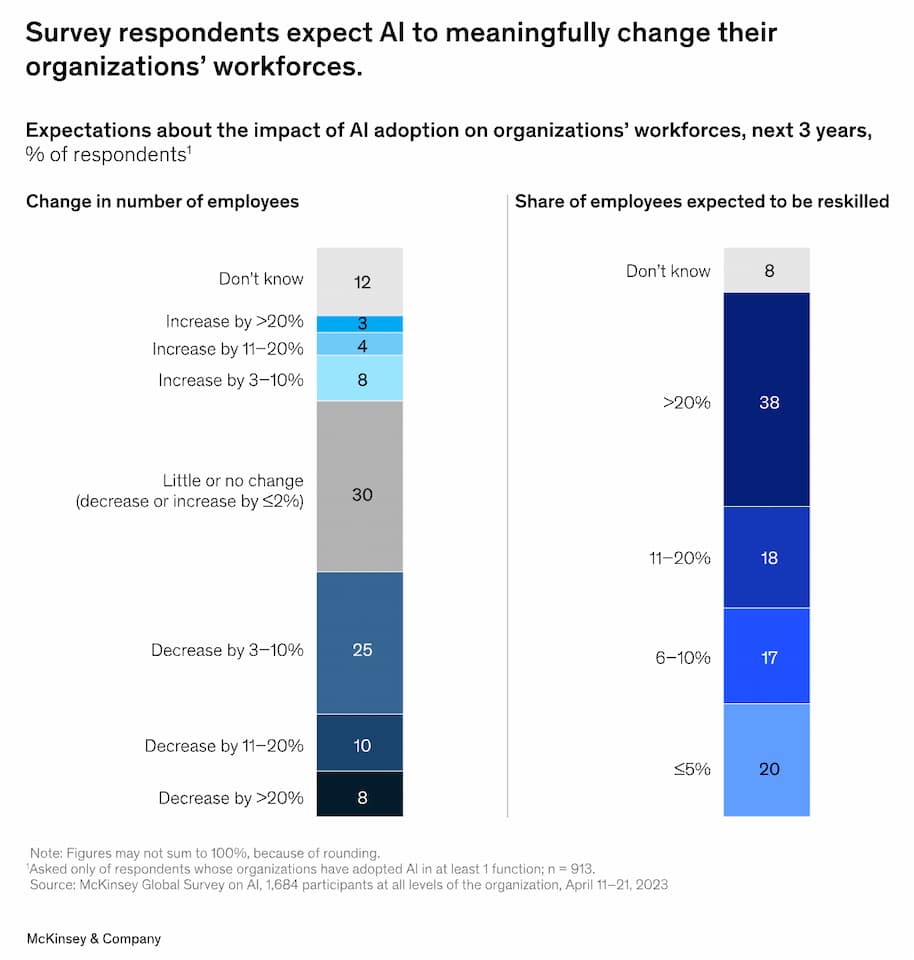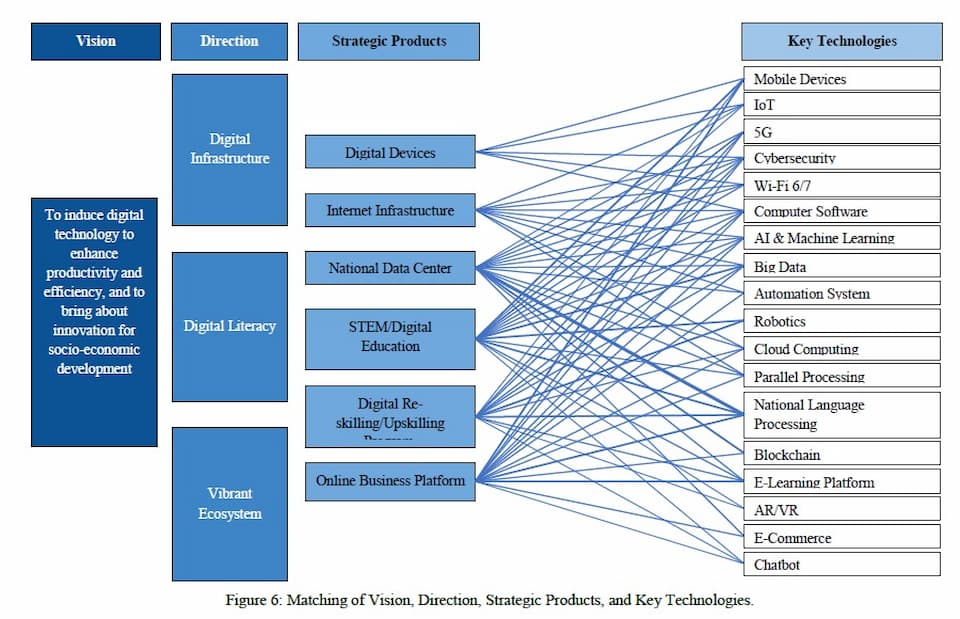The State Of AI In 2023 - How Can Cambodia Embrace Artificial Intelligence?
By
B2B Cambodia
on
The “arrival” of AI (Artificial Intelligence) tools and especially Generative AI (tools such as ChatGPT, Bard etc) firmly became a part of public discord and vocabulary in 2023, even though the technology has been a core part of many well-known and oft-used by individuals and businesses for many years.
We look at some of the recent 2023 reports on AI adoption across businesses and how Cambodia is looking at investing in or utilising AI for its key industries.
Image Credit: AFP
The hype cycle or AI may have peaked already in 2023, with Artificial Intelligence being flung about with reckless abandon by the media, the public, enterprises and of course influencers. Without a doubt, AI is here to stay due to rapid investment, engagement and adoption.
The McKinsey & Company State of AI 2023 report helps shed further light on the adoption of AI and identifies some of the key trends in business. The meteoric growth of generative AI (gen AI) tools in less than a year after many of these were released saw one-third of the report’s survey respondents indicate that their organisations are using gen AI regularly in at least one business function.
Even though it's still early days, the consensus is if you are not looking at utilising AI tools you will be left behind- from writing tools (Grammarly, SEMrush, ChatGPT, Claude2, Bard etc), photography and image editing (Midjourney), marketing, planning and so much more, there will be increased AI adoption.
There are many reports coming out on AI currently - from fears to adoption and much more. We also look at the Ministry of Industry, Science, Technology & Innovation (MISTI) May 2023 report on the AI landscape in Cambodia.
 Image Credit: Reuters
Image Credit: Reuters
 Image Credit: The McKinsey & Company State of AI 2023 report
Image Credit: The McKinsey & Company State of AI 2023 report
 Image Credit: The McKinsey & Company State of AI 2023 report
Companies are now focusing on retraining workers, instead of eliminating jobs to support their AI ambitions which increasingly form part of strategies.
Image Credit: The McKinsey & Company State of AI 2023 report
Companies are now focusing on retraining workers, instead of eliminating jobs to support their AI ambitions which increasingly form part of strategies.
 Image Credit: MISTI
The Ministry of Industry, Science, Technology & Innovation (MISTI) published a May 2023 report on the Artificial Intelligence Landscape in Cambodia: Current Status and Future Trends.”
The Cambodia Digital Economy and Society Policy Framework 2021-2035 includes plans to boost investment in Cambodian infrastructure and the application of AI in data governance, particularly in data use and analysis. There is a demand for Cambodia to adopt AI to bolster its key industries but also tap into the tech and digital sectors.
The Ministry document (which leans more on the academic side), highlights that deep learning, statistical analysis, and robotics could help the country realise its educational promise of artificial intelligence.
The document adds that “Some of the industries that can benefit from AI in Cambodia are healthcare, education, and finance.” But AI can benefit all businesses from small and medium-sized enterprises (SMEs) to big industry and across all major sectors.
Some (and not limited to) examples provided in the report are:
Image Credit: MISTI
The Ministry of Industry, Science, Technology & Innovation (MISTI) published a May 2023 report on the Artificial Intelligence Landscape in Cambodia: Current Status and Future Trends.”
The Cambodia Digital Economy and Society Policy Framework 2021-2035 includes plans to boost investment in Cambodian infrastructure and the application of AI in data governance, particularly in data use and analysis. There is a demand for Cambodia to adopt AI to bolster its key industries but also tap into the tech and digital sectors.
The Ministry document (which leans more on the academic side), highlights that deep learning, statistical analysis, and robotics could help the country realise its educational promise of artificial intelligence.
The document adds that “Some of the industries that can benefit from AI in Cambodia are healthcare, education, and finance.” But AI can benefit all businesses from small and medium-sized enterprises (SMEs) to big industry and across all major sectors.
Some (and not limited to) examples provided in the report are:
 Image Credit: Reuters
Image Credit: Reuters
Key AI Trends - Mckinsey & Company 2023 Report
McKinsey & Company is a global management consulting firm and is considered to be a leading and trusted advisor to some of the world's leading businesses, governments, and institutions. McKinsey published their detailed report on the State Of AI at the start of August 2023, based on results collected in April 2023 from 1,684 participants representing “the full range of regions, industries, company sizes, functional specialities, and tenures.” Among a long list of insights in the report:- One-third of workers said they are now using AI as part of their workflow.
- Seventy-nine per cent said they’ve had some exposure to gen AI, either for work or outside of work, with 22 per cent saying they are regularly using it for work.
- Nearly 25 per cent of C-suite executives said they are personally using gen AI tools for work
- More than one-quarter of respondents from companies using AI say gen AI is already on their boards’ agendas.
- 40 per cent said their organizations will increase their investment in AI overall because of advances in gen AI.
 Image Credit: The McKinsey & Company State of AI 2023 report
Image Credit: The McKinsey & Company State of AI 2023 report
Generative AI Is Already Widespread In Business
Gen AI is taking over. Individuals and organisations are increasingly using gen AI with 60 per cent of organisations using gen AI and a healthy number of companies expect to invest more in AI overall thanks to generative AI, The most commonly reported business functions using AI are:- Marketing and sales
- Product and service development
- Service operations (customer care and back-office support)
- 75 per cent expect gen AI to cause significant or disruptive change in the nature of their industry’s competition in the next three years.
- Industries relying most heavily on knowledge work are likely to see the most disruption (and potentially benefit the most) - tech companies, banking, pharmaceuticals and medical products, and education.
Potential Risks Of Generative AI
Based on the survey results, few companies seem prepared for the widespread use of gen AI and the risks these tools may bring.- 21 per cent said their organisations have established policies governing employees’ use of gen AI technologies in their work and few are mitigating the most commonly cited risk with gen AI: inaccuracy.
- Cybersecurity and regulatory compliance are the next biggest risks.
AI - How Will It Impact Job Roles
 Image Credit: The McKinsey & Company State of AI 2023 report
Companies are now focusing on retraining workers, instead of eliminating jobs to support their AI ambitions which increasingly form part of strategies.
Image Credit: The McKinsey & Company State of AI 2023 report
Companies are now focusing on retraining workers, instead of eliminating jobs to support their AI ambitions which increasingly form part of strategies.
- Nearly 40% of respondents expect over 20% of their workforce to be re-skilled, while only 8% foresee a 20% workforce reduction.
- Organisations using AI most often hired data engineers, machine learning engineers, and Al data scientists.
- Although AI increased the likely percentage of worker activities that could be automated (60 to 70 per cent, up from 50 per cent), this doesn’t necessarily mean the automation of an entire role.
- Employees recognise the need for AI training and upskilling but few are receiving it (Editor's Note- actually much of the AI adoption we have seen are individuals looking to train themselves on the various AI tools to stay ahead of the curve - especially in Cambodia where there are also some limitations with geo-blocking and the need to use VPNS or workarounds to access some of the more popular generative AI tools.)
- 80% of business leaders say that they use generative AI regularly.
Will AI Tool Adoption Slow Down?
The majority of respondents reported AI-related revenue increases within each business function using AI but the survey also didn't indicate that these newer tools are driving organisations’ overall AI adoption. Despite Generative AI's rapid spread in 2023, overall AI adoption remains steady at 55, while usage is limited in scope. AI adoption isn’t seeing a dramatic rise within most organisations- 55 per cent of respondents said their organisations have adopted AI.
- Less than a third said their organisations have adopted AI in more than one business function.
How Can AI Be Used To Benefit Cambodia?
 Image Credit: MISTI
The Ministry of Industry, Science, Technology & Innovation (MISTI) published a May 2023 report on the Artificial Intelligence Landscape in Cambodia: Current Status and Future Trends.”
The Cambodia Digital Economy and Society Policy Framework 2021-2035 includes plans to boost investment in Cambodian infrastructure and the application of AI in data governance, particularly in data use and analysis. There is a demand for Cambodia to adopt AI to bolster its key industries but also tap into the tech and digital sectors.
The Ministry document (which leans more on the academic side), highlights that deep learning, statistical analysis, and robotics could help the country realise its educational promise of artificial intelligence.
The document adds that “Some of the industries that can benefit from AI in Cambodia are healthcare, education, and finance.” But AI can benefit all businesses from small and medium-sized enterprises (SMEs) to big industry and across all major sectors.
Some (and not limited to) examples provided in the report are:
Image Credit: MISTI
The Ministry of Industry, Science, Technology & Innovation (MISTI) published a May 2023 report on the Artificial Intelligence Landscape in Cambodia: Current Status and Future Trends.”
The Cambodia Digital Economy and Society Policy Framework 2021-2035 includes plans to boost investment in Cambodian infrastructure and the application of AI in data governance, particularly in data use and analysis. There is a demand for Cambodia to adopt AI to bolster its key industries but also tap into the tech and digital sectors.
The Ministry document (which leans more on the academic side), highlights that deep learning, statistical analysis, and robotics could help the country realise its educational promise of artificial intelligence.
The document adds that “Some of the industries that can benefit from AI in Cambodia are healthcare, education, and finance.” But AI can benefit all businesses from small and medium-sized enterprises (SMEs) to big industry and across all major sectors.
Some (and not limited to) examples provided in the report are:
- Healthcare: AI could be used to improve the accuracy and efficiency of medical diagnoses and to identify potential health risks and preventative measures (analyse medical images, reduce the risk of misdiagnosis etc)
- Education: Improve the quality of and accessibility to education by using AI to create personalised learning experiences for students.
- Finance: AI could improve the accuracy and efficiency of financial transactions, and to identify potential fraud and money laundering.
- Manufacturing: Implementation of AI can help transform traditional manufacturing into advanced and smart manufacturing and could involve real-time data collection through IoT, automation processes using robotics, and improved daily operations and decision-making through information systems and AI.
- Agriculture: AI could enhance agricultural productivity, monitor crop growth, analyse data and help make informed decisions, as well as predictive analysis.